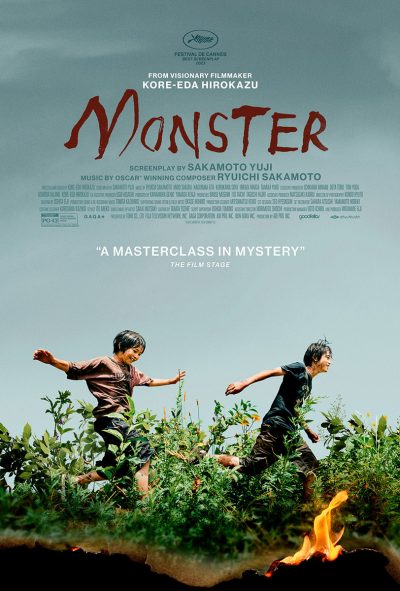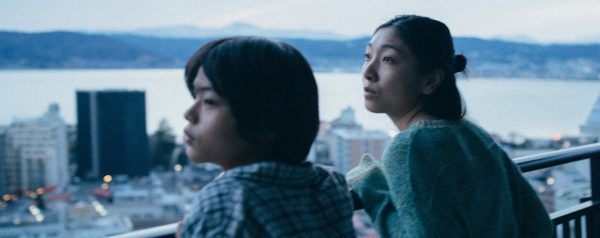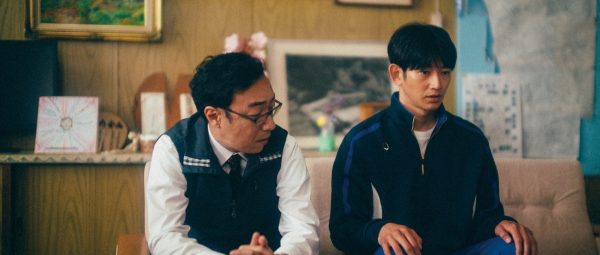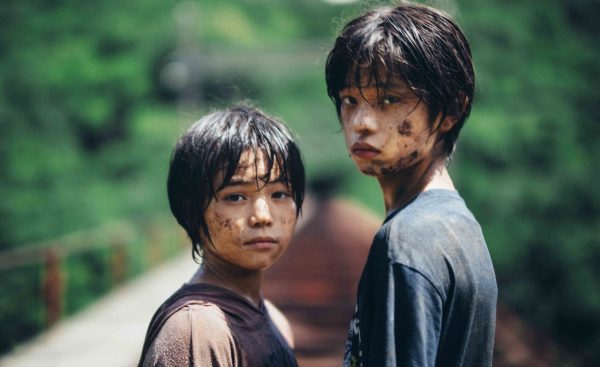
“Monster” (“Kaibutsu”) (2023). Cast: Sakura Ando, Soya Kurokawa, Eita Nagayama, Hinata Hiiragi, Yuho Tanaka, Shido Nakamura, Mitsuki Takahata, Akihiro Kakuta. Director: Kore-eda Hirokazu. Screenplay: Yûji Sakamoto. Web site. Trailer.
The picture’s opening sequence focuses on the exasperating challenges that single mother Saori Mugino (Sakura Ando) faces with her preteen son, Minato (Soya Kurokawa), who has developed a reputation for acting out. She witnesses some of this behavior firsthand, but much of what allegedly happens comes her way as a result of after-the-fact evidence, much of it delivered by way of the unreliable word of others. In light of that, she must often ask herself, how much can she trust what she hears or finds? Minato is her son, after all, and she wants to protect him against unfounded or unfair accusations, some of which appear to lack credibility or adequate explanation. That’s particularly true when Minato’s teacher, Mr. Hori (Eita Nagayama), is accused of excessive discipline in response to one of the youngster’s outbursts against another student, Yori (Hinata Hiiragi), an incident cryptically explained away by the school’s principal, Mrs. Fushimi (Yuho Tanaka), herself a figure of questionable character. Still, given Minato’s behavior, many are quick to paint him with broad brush strokes as a devious little monster. But is he?

In the second segment, the focus shifts to Mr. Hori, who, as viewers discover, is a new teacher at Minato’s school. He’s eager to be starting this new job and looks forward to making a favorable impression on the students, their parents and the administrators. He’s also starting a new relationship with Hirona (Mitsuki Takahata), with whom he’s quite taken. However, not long after beginning work at the school, he notices that Yori is apparently being picked on bullies, something the teacher believes must be difficult for the small, sweet young boy to handle. He takes an interest in the student’s well-being, even going so far as to visit the youth’s family, where he finds him being raised by a drunken, seemingly intolerant father (Shido Nakamura). So, in light of these factors, Hiro quietly assumes the role of a de facto protector, and, when he witnesses the aftermath of an apparent incident involving Yori and Minato, he steps up and takes action. But is his response appropriate? And what do the school administrators like Mrs. Fushimi and Mr. Kumiaki (Akihiro Kakuta) think about it, particularly in light of the impression his actions might leave on skeptical parents, including both Saori and others? In the wake of these developments, Hori is quickly on his way to becoming a pariah, and his life begins falling apart, both personally and professionally. Indeed, is he the monster here?
In the final sequence, the narrative shifts to the relationship between Yori and Minato, which is not at all what others have been led to believe it is. It seems that Mr. Hori is not the only bodyguard that Yori has. But that’s because there’s more to the boys’ relationship than anyone knows. And, when they mysteriously disappear, their absence raises more questions than ever before. Add to that several other cryptic developments that impact the overarching storyline, such as the breakout of a major fire at a nearby high-rise gentlemen’s club and the landfall of a typhoon, and the mystery deepens further. From this, it immediately becomes apparent that no one could possibly have had a clear picture of what’s been going on all along, that the pieces of the puzzle are simply that – pieces of a larger whole that nobody understands.


Think of the impact that could be leveled against those falsely accused (and convicted) in these situations. Is Minato truly the little monster that many contend he is? Or is he simply a misunderstood young man whose actions and behavior have another unseen or mistaken intent underlying them? Conversely, consider the fallout that can result when our beliefs inadvertently lead to us giving a pass to those deserving of deeper scrutiny. Metaphorically speaking, it’s like getting away with murder, the absence of corpses notwithstanding. And, as this story shows, there are several potential culprits in the narrative whose actions and behavior merit a closer look, their deeds coming close to appearing somewhat monstrous themselves.
There are concerns for the accusers in scenarios like this as well. Consider the consequences for those making and pressing incorrect and unfair claims against the supposed suspects. Think of the guilt and potential liabilities that could stem from inflicting such misplaced suspicions. The impact might readily boomerang against those making such accusations, and where would that leave them then?
This is not to suggest that our beliefs don’t have merit in these instances. After all, they’re the building blocks of the reality we create for ourselves. However, we should recognize that they’re the starting point, not the end point of this process in any of our endeavors, including discovering the truth behind a particular scenario. The role they play here is in pointing us toward the evidence needed to back up our contentions, not the means to verify and validate the innate truth behind them. Is it any wonder, then, that our judicial system calls for the revelation of “the truth, the whole truth and nothing but the truth?” It would seem that this is a wise outlook not just for a court of law, but also for the court of public opinion – not to mention the internal courts of our beliefs.

The perspective from which we view a situation infallibly provides us with a clear, irrefutable picture of its truthfulness, right? But what happens if we encounter someone who witnesses the same incident and comes away from it with a totally different interpretation? Both views can’t be “right,” can they? Or is it possible that none of us can see the totality of a scenario and claim to know everything about it? That’s the core takeaway from this captivating dramatic feature, an ambitious, skillfully crafted tale told from multiple vantage points, all of them “correct” in their own right, despite the myriad differences that distinguish them from one another. Director Kore-eda’s cinematic homage to his famed countryman Kurosawa carefully spins a web combining the picture’s various story threads, reminding us of the old adage of not judging a book by its cover, poignantly illustrating that, no matter how much we may think we know about a particular situation, there’s a good chance we’ll never get a complete picture of it. Kore-eda serves up an eye-opening tale, one that gives us pause to think about our impressions and preconceptions in an age when many of us are all too quick to superficially judge what we see – and in a frequently flawed framework at that. The picture could stand to be a little more swiftly paced at times (especially in the final act), but this is arguably the director’s best and most sensitive work to date, one that, we can only hope, will have the kind of profound impact we need in an age where open-mindedness and tolerance are traits we could all stand to develop to a much greater degree – particularly when pieces of the puzzle are missing.
“Monster” has earned its share of accolades, especially at this year’s film festivals. At the 2023 Cannes Film Festival, the picture took home the Queer Palm Award and the trophy for best screenplay, as well as a nomination for the Palme d’Or, the event’s highest honor. It was later recognized with the Gold-Q Hugo Award at the Chicago International Film Festival. While this offering has primarily been playing the film festival circuit, it has recently been distributed in limited theatrical release, primarily at arthouse cinemas.
Copyright © 2023, by Brent Marchant. All rights reserved.

No comments:
Post a Comment